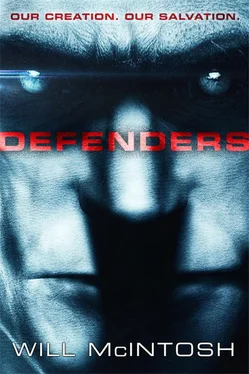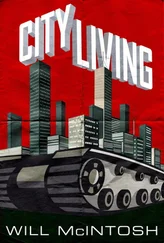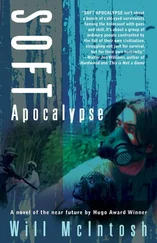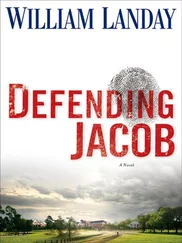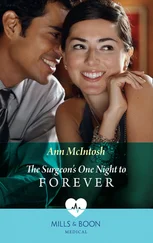Kai shrugged. “No.”
There were a few possibilities. The Luyten might be staying silent because Kai could no longer help it, or because it knew they wanted to communicate with it to seek some advantage in the war. It was also possible the Luyten was communicating with Kai, and Kai was lying because he was on its side. Oliver thought that was unlikely.
“What’s that?” Kai asked, eyeing the population counter on the wall. At the moment it read three billion, seven hundred thousand and change. The numbers went on rolling backward, counting down.
“It’s an estimate of the world population.” The number shrunk by several hundred in the time it took Oliver to answer.
Kai studied it. “How does it know when someone dies?”
“It’s just an estimate, based on updates people here receive.”
Kai pressed his tongue to his upper lip, stared at the readout, mesmerized.
“Why don’t you try talking to the Luyten again?”
“He told me to call him Five.”
The idea of it having a name unsettled Oliver in a way he couldn’t articulate.
“It’s a he?” Oliver asked.
Kai shrugged. “I don’t know. It just seems like a he.”
“Why Five?”
Looking sheepish, Kai shrugged yet again. “I don’t know.”
Luyten tended to congregate in groups of three, when they congregated at all, so Five probably didn’t correspond to his place in a group or family, although it might. It was a prime number, but Oliver couldn’t see how that mattered. Maybe it wasn’t his real name, only one he’d chosen for Kai to use.
“Does the number five hold any special meaning for you?” he asked Kai. “Your lucky number? Your birthday?”
Kai couldn’t take his eyes off the Luyten. “Not really.”
Oliver stared at the Luyten. Looking at it was unpleasant, not only because it was large and terrifying, but because of the wound, the ragged stump.
Oliver folded his arms across his chest, leaned closer, counted its limbs.
Five. There had been six, now there were five.
It was a tiny insight, but it provided a glimpse into how the creature thought.
“Why don’t you try talking to Five again?” he said.
“What should I say?”
“I don’t know. Anything.” Oliver waved his hands, trying to come up with something. Topics of conversation were not his strong suit. “What did you talk about before?”
Kai shrugged. “Where to find food, how scared we were.”
That wouldn’t work now. What else could you talk about with an alien? Maybe they should try to win it over, with pleasant topics. Small talk. Fall back on standard CIA interrogation procedures.
“Tell it about your hobbies.”
“My hobbies?” Kai said it as if he’d never heard the word before.
“Things you liked to do. Before, you know, you couldn’t do them anymore.”
Haltingly, Kai began to talk about a water park near his house, where you surfed up a stationary fifteen-foot wave.
The Luyten remained silent.
July 2, 2029. Savannah, Georgia.
It had once been an indoor flea market. The battered sign by the road, hanging from a rusted pole, read KELLER’S FLEA MARKET. It sported an image of a cartoon flea. Now it was an enormous morgue, a body factory. Lila hated the place, dreaded going in there, but her father was too busy to bring the containers out, and there were too many for Alfe to carry on his own. Plus, Alfe didn’t look any more eager to go inside than Lila.
“You ready?” He was already holding the balled-up T-shirt close to his mouth and nose.
“Shit. I’m never ready to go in there.” She stepped out of the two-seat open buggy she’d salvaged and converted to solar.
Inside, she tried to keep her eyes on the concrete floor, three feet in front of her, but her peripheral vision picked up a bit of the horror show that was all around, and her imagination filled in the rest. The bodies were on tables, on the ground, some literally stacked in piles along the walls. Many were badly burned; most had gaping wounds. The ones who’d been killed by the Luyten’s lightning gun had the soles of their feet blown out.
Even if she were wearing blinders, the rancid stench would have made the place intolerable. Even with the T-shirt covering her mouth and nose, she held her breath as long as possible before taking a quick, gasping breath and holding it again.
Lila wondered if you ever got used to the smell and sight of bodies. Maybe she had, to a degree, only so gradually she hadn’t noticed. Wouldn’t the sight of hundreds of bodies have sent her screaming and gibbering three years ago? Probably.
She spotted her dad, wearing a transparent mask that covered his whole head. He was collecting DNA samples, moving from body to body with a handheld DNA harvester. He spotted Lila and Alfe a moment later, and pointed toward the back of the immense, low-ceilinged space. Lila waved with her free hand, hurried to the back where she found half a dozen battered, filthy red gasoline canisters.
It was difficult to carry three canisters each while keeping the T-shirts in place, but they managed. As soon as they were outside, Lila let the arm holding the T-shirt and one canister drop to her side. She exhaled heavily, trying to drain every ounce of the rotten air out of her lungs before inhaling the relatively fresh outside air.
“I don’t know how he does it,” Alfe said, breathless, hands on his knees. “It’s like being in a pit of hell.”
Lila nodded as she turned and headed for the buggy. The sooner they got downtown, the sooner this hellish errand would be finished. Discovering the taps were not working that morning had shaken Lila, for surely if there was one thing you could count on, it was water.
For Lila, downtown Savannah had always been an oasis, an ancient, beautiful city of manicured squares and elegant architecture. Today it felt like a moldy, menacing place. All around people were running, shouting. There was a heavy police presence, but the police looked as exhausted and scared as everyone else.
Lila turned right onto Bull Street, anxiety rendering her unable to glean even the slightest satisfaction from the way the buggy she’d rebuilt and retrofitted to run on solar power was performing. Ahead, Chippewa Square was all but empty; there was no water distribution going on like they’d heard on the radio.
She pulled over, looked around for some indication of what might have happened.
Someone whistled. Lila spotted an old woman sitting on a porch.
“You looking for water?” the woman called. She was wearing a pink kerchief tied under her chin, and shelling pecans by hand on a rickety card table.
“Yes!” Alfe shouted.
“They moved it to River Street.” The woman pointed east.
Waving thanks, Lila headed toward River Street, wondering why they’d changed the location at the last minute without leaving word at the original site. Things were so uncertain. In the past it was always easy to know who was in charge, where to go for what.
In the seat beside her, Alfe watched the houses roll past while he chewed on his cuticle. In two weeks he’d be sixteen, and he’d go off to fight. Lila would have envied him, would have snuck off and joined him, if going to fight wasn’t synonymous with going to die. She’d be going soon enough—ten months, assuming she was alive ten months from now.
She caught movement out of the corner of her eye and flinched, adrenaline washing through her. It was only a tour bus, likely pressed into service to transport refugees. They wouldn’t suddenly be marauding through downtown, she reminded herself. There would be warning, the emergency siren at least. Sharpshooters were stationed all around the city; high-def cameras that could focus on objects a mile away were watching in every direction. That there were more of them outside the city than usual didn’t mean they were coming.
Читать дальше
